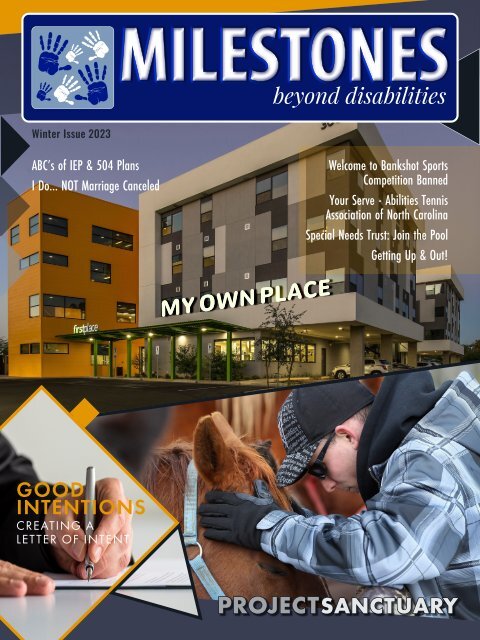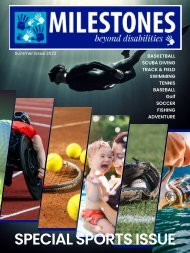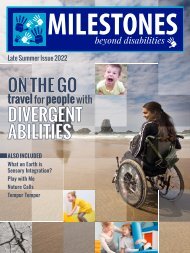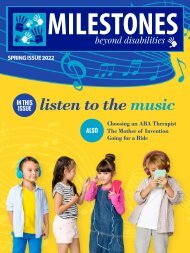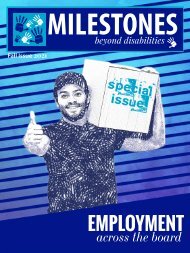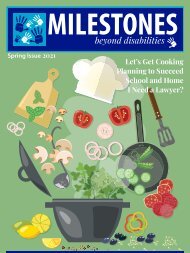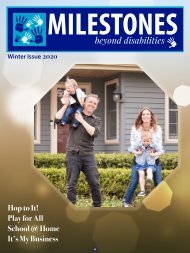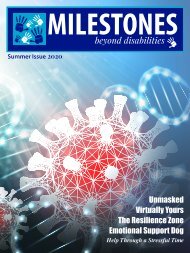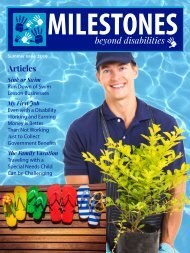Milestones Magazine Winter 2023 Issue
Helping Individuals with Disabilities & their Families Achieve & Celebrate Events & Milestones in their Lives
Helping Individuals with Disabilities & their Families Achieve & Celebrate Events & Milestones in their Lives
Create successful ePaper yourself
Turn your PDF publications into a flip-book with our unique Google optimized e-Paper software.
eyond disabilities<br />
<strong>Winter</strong> <strong>Issue</strong> <strong>2023</strong><br />
ABC’s of IEP & 504 Plans<br />
I Do... NOT Marriage Canceled<br />
Welcome to Bankshot Sports<br />
Competition Banned<br />
Your Serve - Abilities Tennis<br />
Association of North Carolina<br />
Special Needs Trust: Join the Pool<br />
Getting Up & Out!<br />
GOOD<br />
INTENTIONS<br />
CREATING A<br />
LETTER OF INTENT<br />
PROJECT<br />
PROJECTSANCTUARY
ON THE COVER<br />
06 Your Serve -<br />
Abilities Tennis<br />
Association of<br />
North Carolina<br />
(ATANC)<br />
09 ABC’s of IEP & 504 Plans<br />
13 I Do... NOT Marriage Canceled<br />
16 Welcome to Bankshots<br />
03<br />
GOOD<br />
INTENTIONS<br />
Sports Competition<br />
Banned<br />
17 Special Needs Trust: Join the Pool<br />
CREATING A<br />
LETTER OF INTENT<br />
21 Getting Up & Out!<br />
23<br />
PROJECT<br />
SANCTUARY<br />
Publisher<br />
Susie Redfern is the parent of a young adult on the<br />
Autism Spectrum.<br />
She developed <strong>Milestones</strong> <strong>Magazine</strong> to help individuals<br />
with disabilities and their families achieve and celebrate<br />
25<br />
events and milestones in their lives.<br />
info@milestonesmagazine.net<br />
WINTER <strong>2023</strong><br />
<strong>Milestones</strong><strong>Magazine</strong>.net<br />
1
MY OWN PLACE<br />
First Place-Phoenix Apartments<br />
For many young adults, getting out<br />
on their own is a top priority goal.<br />
For most, the biggest (and<br />
sometimes only) obstacle is financial.<br />
People with divergent abilities,<br />
however, not only have the financial<br />
obstacle, but issues of accessibility<br />
and supports needed to accomplish<br />
independent living. Here is a<br />
sampling of projects across the<br />
U.S. that address these issues for<br />
First Place–Phoenix Apartments<br />
“This 81,000-square-foot supportive housing property set in<br />
the heart of the urban region offers 55 Studio, one-, two- and<br />
four-bedroom units for 75 residents who can access a variety<br />
of supports and amenities with all the benefits of communityconnected,<br />
independent living. Vocational services include<br />
volunteer work, internships and employment. Public<br />
transportation is within walking distance. Residents can<br />
participate in scheduled weekly health and wellness, social, and<br />
other activities within the property and out in the Greater Phoenix<br />
community, which has been recognized by PBS NewsHour as<br />
individuals looking for supportive<br />
housing (often rental apartments).<br />
“<br />
the MOST<br />
autism friendly<br />
3<br />
city in the WORLD<br />
WORLD<br />
”
MY OWN PLACE<br />
Wynne Watts Commons<br />
“Wynne Watts Commons is a first-of-its-kind inclusive,<br />
accessible, affordable, and sustainable housing community.<br />
It is located in Gresham, Oregon’s Wilkes East Neighborhood,<br />
and is the largest net zero energy affordable housing<br />
development in the Pacific Northwest.<br />
The Crossings in Gaithersburg MD<br />
“There, seven men with autism and other developmental<br />
disabilities live in their own apartments. The building is not a<br />
group home. It is a five-story complex with a fitness center and<br />
a swimming pool that advertises itself to the general public as<br />
“a brand-new affordable apartment community featuring<br />
1-, 2- and 3-bedroom apartment homes.”<br />
Wynne Watts Commons offers 150 affordable units of studio,<br />
1-, 2-, and 3-bedroom apartments.<br />
But the men’s families, through an organization called<br />
Integrated Living Opportunities, have created a unique and<br />
Because of Albertina Kerr’s extensive Human Services history,<br />
the building also has 30 universally accessible units with<br />
state-of-the-art technology and rental subsidy for people with<br />
intellectual and developmental disabilities (I/DD), allowing<br />
them to live more independently.”<br />
intentional community for them. They have given them a way to<br />
live on their own and yet never feel alone. The seven men get<br />
together for activities, such as movie nights and workout<br />
sessions. They have a life coach and a “community builder,”<br />
which is a staff person who checks on each of them daily<br />
and brings them all together weekly.<br />
Home of Our Own (“HOOO”)<br />
Home of Our Own (“HOOO”) is a 501(c)(3) nonprofit<br />
established to create inclusive, affordable housing for disabled<br />
adults through partnership with other community-based<br />
nonprofits. HOOO began as a family-led grass roots group,<br />
with Prairie Haus opening its doors in December 2020.<br />
Prairie Haus provides 40 apartment homes for disabled adults,<br />
seniors, and working adults and families struggling with the<br />
Home of Our Own (“HOOO”)<br />
rising cost of housing. Prairie Haus is unique because it provides<br />
affordable homes in an integrated setting for individuals with<br />
a wide range of support and behavioral needs, along with<br />
welcoming and adaptive community spaces.<br />
4
HOOO Bases Everything it Does on<br />
Five Core Principles<br />
MY OWN PLACE<br />
1<br />
2<br />
3<br />
4<br />
5<br />
No matter how challenging the disability, disabled adults should be able to live in their own<br />
homes. Barriers based on disability are artificial, and should not prohibit someone from living<br />
independently in their own apartment, with the right supports.<br />
Limited income should not be a barrier to living independently, even if a person’s only<br />
source of income is social security.<br />
People with disabilities have the basic human right to live with all kinds of neighbors - those<br />
of different ages, backgrounds, and family structures. They also should have the opportunity to<br />
build friendships, develop natural supports, socialize, and engage in meaningful activities.<br />
Disabled people should not have to leave their home community to live independently<br />
unless they choose to.<br />
With the right partnerships, any grassroots groups in any community in the United States<br />
should be able to create a similar, inclusive community, so that the local need for affordable,<br />
integrated housing can be satisfied.<br />
M<br />
5
Your Serve<br />
Abilities Tennis Association<br />
of North Carolina (ATANC)<br />
Staying active is important for everyone, including individuals with challenges of<br />
various kinds (physical, sensory, cognitive, etc.). Playing sports is an effective way<br />
for people to maintain a healthy lifestyle, but people with disabilities often have<br />
difficulty participating in sports. Adaptive sports are growing in popularity and<br />
accessibility across the U.S. to help individuals meet these challenges. People<br />
are often surprised to learn that tennis is a highly adaptive sport.<br />
Tennis balls are flying all across North Carolina as more and more people embrace<br />
the idea that tennis is for everyone. Forty-two-year-old Erin Cagle said she never<br />
misses a chance to play tennis. “I just love to whack the tennis ball! I have been<br />
practicing tennis every week, and right now I’m learning about hitting low to<br />
high!” Erin is one of more than 500 athletes with intellectual disabilities who are<br />
provided year-round tennis opportunities thanks to Abilities Tennis Association<br />
of North Carolina (ATANC). Founded in 2007 by two parents and a tennis coach,<br />
the goal was to create a year-round tennis program for athletes with intellectual<br />
disabilities. Collaborating with the North Carolina Tennis Association, they<br />
launched one clinic in the Raleigh area. Today, ATANC hosts seven tournaments<br />
and offers free clinics and programs in almost 30 locations across the state.<br />
Executive Director Lou Welch said the growth testifies to the important role<br />
tennis can play in transforming the lives of individuals with intellectual disabilities.<br />
“As with any sport, practice makes better. Abilities Tennis gives these special<br />
athletes opportunities to practice a sport they love, improve their skills, and then<br />
compete at their level throughout the whole year.”<br />
Rollie Olin, an ATANC coach and parent, said, “Tennis is such a great sport.<br />
It’s a sport for a lifetime. It’s social. It’s great exercise. The athletes truly enjoy it.”<br />
Abilities Tennis is unique from other programs that focus on a sport during a<br />
6
I just enjoy getting to<br />
“practice,<br />
come out and watch my son<br />
improve, and play.<br />
seasonal time frame. “In two and a half months, you’re<br />
just getting going in a sport, whereas Abilities Tennis<br />
takes it to a whole other level where you get to see<br />
players and friends who you make throughout the year.<br />
It’s a 12-month cycle, which is great.”<br />
athlete with an intellectual disability is paired up with<br />
a partner without an intellectual disability to play<br />
doubles tennis. Olin said, “Unified is, I think, a step<br />
up for the athletes because they love the opportunity to<br />
play with folks who don’t have a disability. This is a real<br />
opportunity for them to get to show off their skills.”<br />
“This is our most active year yet,” said Lou Welch.<br />
“Just since January, we have added four new clinic<br />
locations. We’ve also been able to partner with<br />
Please sign up for the monthly newsletter to stay<br />
updated on program offerings, www.atanc.org.<br />
several of our state’s college tennis teams to host our<br />
clinics and tournaments, and we’ve engaged some of<br />
North Carolina’s top tennis coaches to provide<br />
highly-skilled instruction at clinics for our athletes.”<br />
In September, ATANC hosted the state-wide Unified<br />
Doubles Qualifier Tournament in Raleigh. The<br />
winners of the Qualifier received an all-expenses-paid<br />
trip to compete at the National Adaptive Tennis<br />
ATANC also supports the inclusion of adaptive<br />
tennis in school physical education classes through<br />
Tournament held on the National USTA Tennis<br />
Campus in Orlando, Florida.<br />
its PE Abilities Tennis (PEAT) program. Initiated<br />
in 2012 in the Wake County Public School System,<br />
PEAT has expanded into other North Carolina cities<br />
(most recently in Rocky Mount). The goal of PEAT is<br />
to support each school’s efforts to provide inclusive<br />
programming for students with intellectual disabilities.<br />
Playing unified doubles is another way ATANC works<br />
to promote inclusion and provide an enhanced<br />
experience for their athletes. In unified doubles, one<br />
“Tennis is truly a sport for everyone, from a beginning<br />
recreational player to the highly-skilled professionals<br />
we watch on the biggest stages. The beauty of tennis<br />
is that there’s plenty of room in that range for athletes<br />
with intellectual disabilities,” Welch said. And ATANC<br />
is always excited to showcase how tennis can be<br />
adapted so everyone can participate in the sport. In<br />
2019, ATANC was selected by Net Generation to take<br />
7
Tennis is such a great sport.<br />
It’s a sport for a lifetime.<br />
It’s social. It’s great exercise.<br />
The athletes truly enjoy it.<br />
”<br />
25 Abilities Athletes to the biggest stage of tennis–the<br />
US Open in New York City. The athletes were invited<br />
to show off their skills and demonstrate how tennis can<br />
be adapted for players with intellectual disabilities. It<br />
was the first-ever such demonstration by an adaptive<br />
program on Ashe Stadium at night.<br />
accomplishment in having improved their skills. As<br />
Dennis Thompson, whose son Chris has mastered a<br />
wicked serve, said, “I just enjoy getting to come out<br />
and watch my son practice, improve, and play.”<br />
Rollie Olin agrees. “We all need to feel good about<br />
ourselves, and this gives my son that. It gives him<br />
a sense of identity. He loves seeing his friends, his<br />
ATANC also supports the families of their athletes.<br />
peers. He looks forward to these events like none<br />
Parents and caregivers get a chance to see their<br />
children pursue their interests and feel the pride of<br />
other. Abilities Tennis truly is a blessing.”<br />
M<br />
8
‘s<br />
of<br />
&50<br />
q & a format<br />
Every family that enters the special education world starts with an<br />
I.E.P., which stands for stands for Individualized Education Program).<br />
It defines the services and accommodations to which the child is<br />
legally entitled. It can be the source of conflict when there is<br />
disagreement between the family and school district on what<br />
services and accommodations are needed.<br />
To elaborate on the topic, I am pleased to introduce Ona Krebs,<br />
with highlights of her presentation to CHADD about ABCs of the I.E.P.,<br />
written in a q & a format.<br />
9
4<br />
Question: What is an I.E.P.?<br />
Answer: I.E.P. stands for Individualized Education Plan. An IEP<br />
must contain information about the child and the specific<br />
and unique educational program designed to meet their<br />
needs. The document includes the child’s present levels<br />
of academic achievement and functional performance<br />
(PLAAFP), which describes in the general education<br />
curriculum. The I.E.P. specifies goals and objectives for<br />
the child, and includes specialized instruction, measurable<br />
annual goals; progress reporting; special education, related<br />
services, and supplemental aids and services; program<br />
modifications and accommodations supports; Least<br />
Restricted Environment statement; participation in<br />
district - wide state tests; description of service delivery;<br />
postsecondary transitions components, and transition<br />
services and activities.<br />
Question: How do I go about getting my child (age 3 or<br />
older) tested for special education services?<br />
Answer: Write a letter to the Director of Special Education<br />
of your district requesting an evaluation (keep a copy for<br />
yourself). It will take up to 30 days for a response.<br />
Note: Once a date has been scheduled for the eval it will take<br />
up to 60 days for the diagnosis. If you do not agree with the<br />
districts diagnosis you can go for an out of district<br />
evaluation at school district expense.<br />
10
Question: How do I know if my child should be evaluated?<br />
Answer:<br />
Look for difficulties with academic performance (poor grades,<br />
problems completing homework, frequent notes from teachers, etc.);<br />
and/or social/emotional/behavioral indications (outbursts, isolation<br />
from peers, etc.). If a child is attending public school, the teacher may<br />
flag possible problems and refer a child for testing (parental consent is<br />
required). Most importantly, trust your instincts. If your spidey sense<br />
tells you something is wrong with your child’s development, it<br />
probably is.<br />
Question: What is a section 504 plan?<br />
Answer: A 504 Plan, named after the Section 504 Rehabilitation Act,<br />
ensures an individual cannot be discriminated against due to their<br />
disability. These plans provide support and accommodations, but do<br />
not include goals and objectives. 504 plans are reviewed periodically<br />
based on their disability. Accommodations can include assistive<br />
504 PLAN<br />
technology, preferential seating, getting a list of instructions, receiving<br />
class notes to the lesson and larger text, another set of textbooks to<br />
keep at home, among many others. 504 plans also address<br />
accommodations needed for health issues such as diabetes<br />
and food allergies.<br />
Question: What qualifies a child for special education services?<br />
Answer: In accordance with IDEA, there are 13 categories (diagnoses)<br />
qualifying a child for services: ADHD, Autism, Deaf-Blindness, Deafness,<br />
Emotional Disturbance, Hearing Impairment, Intellectual Disability,<br />
Orthopedic Impairment, Other Health Impairment (Lack of Services),<br />
Specific Learning Disability (SLD), Speech or Language Impairment (SLI),<br />
Traumatic Brain Injury (TBI), and Visual Impairment.<br />
11
Question: What sort of testing/evaluation is done?<br />
Answer: School districts typically perform a<br />
Comprehensive Learning Assessment, which<br />
addresses cognitive processing abilities (such as<br />
memory, reasoning, attention, and executive<br />
functioning). When autism is suspected, they may<br />
do an ADOS (Autism Diagnostic Observation<br />
Schedule) to assess communication, social<br />
interaction, play, restrictive and repetitive behaviors.<br />
They will also look at motor skills, social skills/<br />
interactions, sensory processing, and<br />
emotional/behavioral factors.<br />
Depending on the situation, you can also<br />
do one or more of the following: Find an<br />
advocate, call your state Protection and<br />
Advocacy group, find a support/parent<br />
group for your child’s disability, file a state<br />
complaint (Different states offer different<br />
kinds of complaints), call your state’s<br />
Department of Education, call the Office<br />
of Civil Rights to make a complaint, hire<br />
an attorney. call your local or state<br />
governmental representative.<br />
Question: What should a parent do when you<br />
believe the school district is not acknowledging<br />
your child’s difficulties or diagnosis; is not<br />
offering sufficient services; and/or is not<br />
Ona Krebs is an IEP Coach, based in<br />
New York. She can be reached by phone<br />
at 516-316-6485, on the web at<br />
Oneilconsult.com, and email at<br />
complying with the I.E.P. as written?<br />
Oneilconsulting1@gmail.com.<br />
M<br />
Answer: Keep your communication is factual and<br />
professional (start with the teacher and work up the<br />
chain of command as necessary). Make sure you are<br />
documenting everything (don’t forget to keep<br />
a copy of each communication for yourself).<br />
12
I Do . . .<br />
NOT Marriage Canceled<br />
Roughly half of all marriages fail, for many reasons.<br />
Most divorcing parents assure their children the<br />
marital break-up is not their fault, which of course<br />
it isn’t. However, when parents aren’t on the same<br />
page regarding their children (discipline, etc.)<br />
that conflict, over time, can break up marriages.<br />
Lynda has personal and professional experience<br />
across a wide gamut of financial and estate<br />
planning, including women undergoing divorce<br />
and families needing to plan for their special needs<br />
children. Her credentials include CFA®,<br />
CDFA®, and ChSNC®,<br />
Having a child with diagnosed medical or<br />
congenital condition that has lifelong consequences<br />
can cause much stress. Some parents come together<br />
for these challenges; others do not. For amicably<br />
divorcing couples who, despite their own<br />
differences, are on the same page regarding<br />
their children with special needs, a divorce can<br />
be handled simply, often without the need for<br />
lawyers and other major expenses.<br />
Mistake #1 Accepting child support arrangements<br />
that don’t take into consideration the financial<br />
costs of a child with special needs. In addition,<br />
approximately 2/3 of all states require some form<br />
of parental financial support after the age of 18 if<br />
the child has profound special needs. Keep careful<br />
records of the costs of therapies, medicines, tutors,<br />
respite care providers, wheelchairs, etc., and plan<br />
for those beyond the age of 18, even if child<br />
For other divorcing couples, the consequences<br />
support is not mandated.<br />
can be devastating, both emotionally and<br />
financially. The stress of living and dealing with a<br />
child who has challenges, particularly mental health<br />
issues, increases both the rate of divorce, and the<br />
likelihood that the divorcing couple is not on the<br />
same page regarding the welfare and future needs<br />
of their child. Due to the contested state of affairs<br />
for these folks, legal dissolution of the marriage<br />
is usually necessary.<br />
Mistake # 2 If your child is eligible for government<br />
entitlements to support him, do not collect child<br />
support in the child’s name. This can make him or<br />
her ineligible for government assistance, such as<br />
Supplemental Security Income (SSI) or Medicaid<br />
Waiver programs that provide services to, among<br />
others, adults with developmental disabilities.<br />
Instead, child supports should be directed to<br />
the SNTs. (supplemental needs trusts)<br />
To speak to this often-complicated situation.<br />
I am pleased to introduce Lynda Kommel-Browne,<br />
a financial planner, who has created a webinar titled<br />
Divorce and the Financial Protection of Children<br />
with Special Needs.<br />
Mistake #3 Life Insurance snafus: If the<br />
proceeds of a life insurance policy is intended for<br />
the care and support of a child with a disability<br />
(particularly after he or she turns 18), various<br />
13
14
circumstances can derail that plan, including;<br />
· The child with special needs is personally named as<br />
the beneficiary. Name the SNT, not the child.<br />
· If owner of the policy remarries, have an agreement<br />
that the proceeds of the policy must still be for the<br />
child with special needs, not for the new spouse.<br />
· Whichever spouse is planning to take out the policy,<br />
they need to confirm that they are insurable before<br />
the divorce is finalized, not afterwards.<br />
· Confirm that the owner and the beneficiary are the<br />
same. The spouse taking out the insurance is the<br />
insured. If the owner is the same person as the<br />
beneficiary, they will be able to have visibility<br />
around premium payments should the insured<br />
stop making payments.<br />
expenses” for the money (education, training, recreation,<br />
nutritional supplements, therapy, etc. This account has<br />
investment options. Current law specifies the age of<br />
onset of the disability to be age 26 or earlier, Many<br />
disabilities meet the criteria to allow an individual to open<br />
an ABLE. (consult ABLENOW.com or Fidelity.com with<br />
excellent ABLE account background reading) ABLE<br />
investment accounts benefit not only from the magic of<br />
compounded interest to grow the pot of money, but also<br />
from their tax-free status. The money in an ABLE grows<br />
tax free, and there are no taxes that need to be paid<br />
upon withdrawal, as long as the money is used for a<br />
“qualified disability expense.” They also have a checking<br />
account option, which allows a working individual with<br />
a disability to earn (and most importantly, save)<br />
significantly more money on a month-to-month basis<br />
than one limited to the asset limits imposed through<br />
SSI or Medicaid waiver programs.<br />
Mistake #5 Improperly handling health insurance.<br />
Divorce decrees can specify who pays the premiums for<br />
a child’s health insurance. Children can stay on their<br />
parent’s health insurance until age 26. There are a few<br />
health-insurance plans that allow for a child to stay on a<br />
parent’s plan longer, if they are declared a “disabled adult<br />
child” (provided premiums are paid on schedule) This<br />
Lynda Kommel-Browne and her Family<br />
process should be started 3-6 months before the child’s<br />
26th birthday.<br />
Mistake #4 Not establishing/funding an ABLE Account,<br />
to be used for the benefit of a disabled child (particularly<br />
when he or she reaches age 18). While ABLE accounts<br />
are in the name of the individual with a disability, the<br />
investment account can hold up to $100,000 without<br />
disqualifying individuals with disabilities from receiving<br />
government benefits such as SSI and Medicaid Waiver<br />
programs. There are specific allowed “disability<br />
Lynda Kommel-Browne, CFA®, CDFA®, ChSNC®,<br />
is a Special Needs Financial Planner with<br />
RoundRock Advisors in their Wilton CT office.<br />
She can be reached by phone at 917-374-6948 or<br />
email at lkommelbrowne@roundrockadvisors.com.<br />
You can also visit her on LinkedIn or watch a<br />
Video Recording. M<br />
15
welcome to<br />
Competition<br />
Banned!<br />
People with divergent abilities often have a difficult (at best)<br />
time participating in recreational activities on an equal footing<br />
with peers. Team sports, with their competitive nature (not to<br />
mention rules), are an especial “bridge too far” for people with<br />
developmental, cognitive, and sensory challenges. One<br />
approach to this dilemma is taken by organizations such as<br />
Special Olympics; but the founders/organizers of Bankshot<br />
Sports went a different route.<br />
The court is designed to have players shoot at an angle. It also<br />
has a series of uniquely shaped backboards and hoops placed at<br />
Bankshot Sports came into existence 30 years ago. Protestant<br />
Minister James Naismith and Rabbi Dr. Reeve Brenner were<br />
instrumental in its founding. Bankshot Sports are characterized<br />
as Total-Mix lnclusion based on Universal Design. Bankshot<br />
Playcourts are unique as drop-in, walk-on family sports leaving<br />
no one marginalized to the sidelines.<br />
8 feet. The Bankshot court helps those who are playing with<br />
confidence, self-competitiveness, and integration. Gary,<br />
using a wheelchair, Larry’s two kids with autism, Richard with<br />
mobility limitations and a 90 year old grandfather are provided<br />
with spontaneous “whenever” participation, challenging<br />
for all ages.<br />
Back in 2018, The National Association for Recreational Equality<br />
hosted a non-competitive Bankshot shoot-around for those<br />
with disabilities. This event took place in Rockville, MD, at the<br />
Bankshot court at Mattie Stepanek Park, dedicated to those<br />
with autism, ADHD and other challenges, along with their<br />
References: www.dcnewsnow.com/news/local-officials-aimto-get-children-with-disabilities-more-involved-in-sports.<br />
Contact information for Bankshot Sports:<br />
330-U N Stonestreet Ave #504 Rockville MD 20852<br />
800-933-0140 / 301-309-0260<br />
families and friends.<br />
www.bankshot.com / bankshotsports@aol.com.<br />
M<br />
16
Trust.<br />
Special Needs Trust: Join the Pool<br />
Creating a properly done special needs trust is a rather<br />
The phrase “Trust Me” (often followed by the<br />
sentence “What could possibly go wrong”), has<br />
been used by people for ages, usually when they’re<br />
complicated process that requires a specialized lawyer<br />
(a Special Needs Trust, if not done 100% correctly, can<br />
plunge families into a world of trouble).<br />
trying to get someone to do an (often dangerous)<br />
stunt of some kind.<br />
An additional complication, for many families, is that<br />
the amount of their assets does not lend itself to them<br />
In this instance, however, I’m using the phrase<br />
“Trust Me” literally, in the sense of creating a legal<br />
trust for people with disabilities (commonly<br />
referred to as a Special Needs Trust).<br />
being able to justify or afford an individual special<br />
needs trust. For them, a pooled trust can be an option.<br />
I am pleased to introduce Harry Margolis, a Special<br />
Needs lawyer, to speak to this subject.<br />
To Start: Some Special Needs Trust Classification<br />
To put pooled special needs trusts in context, there are four basic types<br />
of special needs trusts, each with its own rules and application.<br />
They are the following:<br />
A third-party special needs trust created by one or more people for<br />
A third-party pooled trust. Numerous non-profit organizations provide<br />
1<br />
the benefit of an individual with disabilities. These are often created by<br />
trustee services for beneficiaries with special needs. These can be less<br />
2<br />
parents or grandparents for the benefit of children or grandchildren.<br />
expensive to set up because the grantor does not need to create a<br />
brand-new trust. They often make sense when families do not have an<br />
A self-settled special needs trust, also called a “(d)(4)(A)” or<br />
appropriate individual to serve as trustee and the amount in trust is<br />
3<br />
“pay-back” trust. These trusts are created with the beneficiary’s own<br />
insufficient to justify the expense of hiring a professional trustee such<br />
funds (and are sometimes referred to as the “oops” trust, if they are<br />
as a bank, trust company, or lawyer.<br />
used for funds coming from someone other than the beneficiary, since<br />
such funds can go into trusts without a payback provision). To shelter<br />
A self-settled pooled trust, also called a “(d)(4)(C).” Similar to a<br />
funds in order that the beneficiary qualify for Medicaid or Supplemental<br />
(d)(4)(A) trust, a (d)(4)(C) qualifies for a safe harbor in the Medicaid<br />
4<br />
Security Income (SSI), the trust must meet certain requirements set out<br />
and SSI laws that permit a beneficiary to shelter their own funds and<br />
in federal law, to which the name “(d)(4)(A)” trust refers. The name<br />
continue to qualify for benefits. While (d)(4)(A) trusts are created for<br />
“pay back” trust refers to one of these requirements, that upon the<br />
individual beneficiaries, (d)(4)(C) trusts are created and managed by<br />
beneficiary’s death the state be reimbursed from the trust for any<br />
non-profit organizations for numerous beneficiaries.<br />
Medicaid expenditures made on their behalf.<br />
17
This chart should help explain<br />
the differences among these trusts:<br />
Third-Party Trust<br />
Funded by the Grantor<br />
Self-Settled Trust<br />
Funded by the Beneficiary<br />
Individual Special Needs Trust (d)(4)(A) Trust<br />
Pooled Third-Party Pooled Trust (d)(4)(C) Trust<br />
In most instances, assets in trusts created by an<br />
applicant for SSI or Medicaid (as opposed to trusts<br />
created by others for the applicant’s benefit) will be<br />
counted as belonging to the individual and render<br />
them ineligible for benefits. However, Congress<br />
carved out two exceptions to this rule, one for<br />
individual trusts and the other for pooled trusts<br />
managed by non-profit organizations. The names,<br />
(d)(4)(A) and (d)(4)(C) refer to these statutory<br />
exceptions. While this is a federal law and each<br />
state has its own Medicaid program, the state<br />
Medicaid laws must comply with federal law in<br />
order to qualify for federal cost sharing.<br />
One main difference between (d)(4)(A) and (d)(4)(C)<br />
trusts is that (d)(4)(A) trusts must be funded while the<br />
beneficiary is under the age of 65 (though they<br />
continue to be valid after the beneficiary passes that<br />
age threshold). This is not the case with (d)(4)(C) trusts;<br />
they can be funded at any age. However, the states<br />
differ on whether they impose a Medicaid transfer<br />
penalty for funding the trust after age 65. In those states<br />
that do impose such a penalty, the fact that the trust<br />
may be funded post-65 may be of little benefit. But in<br />
other states that do not impose such a penalty, (d)(4)<br />
(C) trusts are often used by nursing home residents<br />
to shelter some funds for their needs while Medicaid<br />
The main rules for (d)(4)(C) trusts to qualify for the safe<br />
pays for their care.<br />
harbor are:<br />
a. The beneficiary must be disabled.<br />
b. The trust must be managed by a non-profit<br />
organization.<br />
c. Upon the beneficiary’s death, any funds remaining<br />
(d)(4)(C) trusts vary in what portion of the funds they<br />
retain upon the beneficiary’s death, from none at all to<br />
all the remaining funds. In some cases, state rules limit<br />
the amount of funds the non-profit trustee may retain.<br />
in trust must be paid to the state to the extent of its<br />
Medicaid expenditures on the beneficiaries’ behalf,<br />
except to the extent they are retained by the<br />
non-profit organization.<br />
18
Trust.<br />
the services available in their state or community. They also<br />
Benefits of (d)(4)(C) Pooled Trusts<br />
If you or a family member have assets and need to qualify<br />
have extensive experience working with individuals with<br />
disabilities and are sensitive to their needs.<br />
for SSI or Medicaid, you have a choice of sheltering those<br />
assets by transferring them into an individual (d)(4)(A) trust<br />
or a pooled (d)(4)(C) trust. The benefits of the latter over<br />
the former include:<br />
Disadvantages of (d)(4)(C) Pooled Trusts<br />
The main disadvantage of (d)(4)(C) pooled trusts is lack<br />
of control. The beneficiary is subject to the decisions of the<br />
trustees in terms of trust distributions and must comply with<br />
No need to draft a trust. Each (d)(4)(A) trust must be<br />
drafted individually, meaning legal fees and working with<br />
an attorney to make sure its terms are what the grantor and<br />
beneficiary want. With (d)(4)(C) trusts, there’s a standard<br />
trust document that governs all the individual accounts.<br />
the trust’s procedures and systems which are created to<br />
enable the administration of numerous accounts. They<br />
may not fit well with the situation or needs of individual<br />
beneficiaries. They may also be more bureaucratic than<br />
some beneficiaries find comfortable.<br />
The individual beneficiary need only execute standard<br />
documents to sign on to the trust.<br />
In some cases, the trust’s retention of funds upon the<br />
beneficiary’s death may be seen as a disadvantage.<br />
Ready-made trustee. One of the most difficult challenges<br />
when creating special needs trusts is choosing the<br />
appropriate trustee, whether a family member or a<br />
professional. With pooled (d)(4)(C) trusts, the non-profit<br />
organization either serves as trustee or may appoint<br />
a board that serves in this role for all the beneficiaries.<br />
While the state is entitled to payback of its Medicaid<br />
expenses upon the beneficiary’s death, to the extent such<br />
payback does not eat up all the remaining funds, they may<br />
be distributed to family members or individuals named by<br />
the beneficiary. If some of the funds are also kept by the<br />
non-profit organization, it’s less likely that any will remain<br />
for successor beneficiaries.<br />
Available for small trusts. It can often be difficult to find a<br />
professional trustee for smaller trusts in large part because<br />
their fees would eat up too much of the trust principal. This<br />
is not the case with pooled trusts, most of which will accept<br />
accounts of any size.<br />
Third-Party Pooled Trusts<br />
While most non-profits that offer pooled trusts started<br />
exclusively offering (d)(4)(C) trusts to help the populations<br />
they serve qualify for SSI and Medicaid under the law’s<br />
safe harbor; many have expanded to offer the same<br />
Post-65 funding. In those states that don’t apply a<br />
Medicaid transfer penalty, (d)(4)(C) trusts may be funded<br />
after age 65. This is not the case with (d)(4)(A) trusts.<br />
services for third-party trusts. Unlike (d)(4)(C) trusts,<br />
third-party pooled trusts do not have to reimburse the state<br />
for its Medicaid expenses on the beneficiary’s behalf upon<br />
their death. However, the non-profit group may still require<br />
Knowledgeable trustees. Since (d)(4)(C) pooled trusts work<br />
with many beneficiaries with disabilities their staffs are very<br />
a portion of the remaining funds go its coffers to help fund<br />
the trust’s administration or for other purposes.<br />
knowledgeable about the rules of benefit programs and<br />
19
It often makes sense for parents or grandparents<br />
of individuals with disabilities to take advantage of this<br />
service when they do not have family members who<br />
might serve as trustee or the amount of funds they are<br />
leaving in trust are too small to justify hiring a traditional<br />
professional trustee. In addition, if the beneficiary already<br />
pooled-trust. This is a great starting point. However,<br />
ask other families about their experiences with the pooled<br />
trusts in your community. Only beneficiaries and their<br />
families will know what it is really like to work with<br />
particular organizations and trustees.<br />
has an account with the non-profit organization’s (d)(4)(C)<br />
trust, coordination may work better if the same organization<br />
serves as trustee of the beneficiary’s third-party trust.<br />
Harry S. Margolis practices elder law, estate and<br />
special needs planning at Margolis Bloom & D’Agostino<br />
in Boston and Wellesley, Massachusetts, and is a founder<br />
Finding a Pooled Trust<br />
The Academy of Special Needs Planners provides a<br />
comprehensive directory of pooled disability trusts<br />
of the Academy of Special Needs Planners. He is author<br />
of The Baby Boomers Guide to Trusts: Your All-Purpose<br />
Estate Planning Tool and answers consumer questions<br />
nationwide on its website at specialneedsanswers.com/<br />
about estate planning issues at www.AskHarry.info.<br />
M<br />
20
UP OUT! &<br />
An often-expressed piece of<br />
advice given to individuals by friends and<br />
acquaintances is “You need to get out more”<br />
(usually in relation to their not seeming to know<br />
what’s going on in the world). Although being<br />
Weller Day Boat Outings:<br />
Individual, Small Group, Large<br />
Group; for children/adults with life threatening<br />
illnesses and/or disabilities, veterans and active<br />
military personnel, and at-risk youth.<br />
ignorant of the state of world affairs can assist<br />
one’s mental health in some ways; getting out<br />
and doing things in your community or elsewhere<br />
(whether work, recreation, or other activities),<br />
can be crucial for an individual’s physical and<br />
mental health.<br />
Freedom Waters Foundation has partnered with<br />
Collier County Parks and Recreation to offer<br />
Adaptive Sailing. The program meets at Sugden<br />
Regional Park in Naples, weekdays on T-TH, and on<br />
Saturdays, from Noon-3:00 PM, Oct. through April.<br />
Program participants are invited to participate is the<br />
The conundrum for individuals with divergent<br />
annual Murdo Smith Adaptive Sailing Regatta.<br />
abilities (whether due to injury, illness or a<br />
congenital condition, meaning present at birth) is<br />
how to do that. What supports and accommodations<br />
are available? To speak to that, I am pleased to<br />
introduce Freedom Waters Foundation, one of<br />
hundreds (if not thousands) adaptive sports /<br />
recreation programs across the country.<br />
Freedom Waters Foundation provides free<br />
marine-related programs for individuals with a<br />
variety of challenges, including children with<br />
cancer, veterans with PTSD, and people with<br />
physical, sensory, or mental health issues.<br />
21<br />
18
Veterans Program: Freedom Waters Foundation<br />
provides boating and fishing opportunities for<br />
veterans and their family members. Veterans<br />
Programs take place year-round in South Florida.<br />
Annual events in Atlanta and in Indiana include<br />
offering the opportunity for these at-risk youths to<br />
enhance their life. At the Heels and Reels Fishing<br />
Tournament female fishing mentors work with teen<br />
girls; the Buoys and Bait Fishing Tournament allows<br />
male fishing mentors to work with teen boys.<br />
individual and small boat trips as well as Veterans<br />
Meet-and-Greets aboard larger commercial vessels.<br />
Freedom Waters Foundation can be contacted at<br />
239-263-2377. Veterans who wish to participate<br />
Fishing Programs: Freedom Waters Foundation<br />
offers fishing opportunities for participants,<br />
providing fishing tackle and bait. As with the<br />
other programs, children/adults with life threatening<br />
can complete a sign-up form online. Fishing<br />
program participants can fill out a self-referral<br />
form; potential fishing mentors can complete a<br />
volunteer application.<br />
illnesses and/or disabilities, veterans and active<br />
military personnel can participate.<br />
Freedom Waters Foundations depends on one-time<br />
donations, corporate sponsorships, peer to peer<br />
Naples, Florida Fishing Tournaments for At-risk<br />
Youth: Fishing mentors are partnered with teens,<br />
fundraisers, and more. You can visit the donation<br />
page on the website for further info. M<br />
22
GOOD INTENTIONS<br />
CREATING A<br />
LETTER OF INTENT<br />
The path to a secure future<br />
for a child with special needs<br />
is mostly paved with financial<br />
and legal documents and<br />
investments, which can be<br />
Without this otherworldly ability, how do we<br />
convey all the intimate details required to allow<br />
another individual to provide the quality of care<br />
we as parents desire for our children should that<br />
unfortunate need arise?<br />
(sometimes must be) done<br />
with the aid of a special-needs<br />
lawyer or financial planner.<br />
A Letter of Intent, sometimes called a Memorandum<br />
of Intent, includes as much information about your<br />
child as you can provide. This is the best way to<br />
The Letter of Intent is<br />
different. This one is totally<br />
up to the parents. Basically,<br />
ensure that the assistance and loving guidance your<br />
child receives aligns with the standard of care you<br />
would strive for.<br />
it provides important details<br />
about your child (Cliff Notes<br />
Let’s pause to think about when this letter becomes<br />
GOOD INTENTIONS<br />
CREATING A LETTER OF INTENT<br />
version) to future caregiver(s)<br />
and is something many parents<br />
(including yours truly)<br />
procrastinate on. For that<br />
reason, I am pleased to<br />
introduce Kevne Sharpe, a<br />
financial planner with Mariner<br />
Wealth Advisors, to enlighten<br />
us on what to include in a<br />
Letter of Intent, whom it<br />
should be provided to, when<br />
and how to update it and more.<br />
Any “trekkies” out there?<br />
Remember Spock’s “mind<br />
meld”? As a refresher, it was<br />
a telepathic link that Vulcans,<br />
from the original “Star Trek”<br />
franchise, were able to create<br />
relevant. You have recently passed, and everyone<br />
you know is trying to process your loss. Your child<br />
may be hardest hit. Who do they turn to? Who can<br />
they trust? You want this important document in<br />
the hands of that special person who is stepping up<br />
to comfort your child and provide the support they<br />
need. Not only would you want a new guardian to<br />
have this letter but also other interested parties such<br />
as siblings, grandparents, and close friends.<br />
While not a legal document—directions in wills,<br />
trusts and other legal documents take precedence—a<br />
Letter of Intent will serve as the primary source of<br />
information about your child, providing a road map<br />
for the courts, guardians, caregivers, and others<br />
involved in your child’s life. Once it is completed,<br />
make sure to keep a copy of your Letter of Intent<br />
with your estate plan documents.<br />
with other organisms. A mind<br />
Consider your Letter of Intent a love letter to your<br />
meld allowed a Vulcan to know<br />
child. It can be the greatest gift you can provide the<br />
the innumerable details of our<br />
new caregiver as they attempt to fill your shoes.<br />
lives, including those as<br />
caregivers of our children,<br />
When starting the process of creating your Letter of<br />
with a simple scalp massage.<br />
Intent, you begin to realize all you do for your child.<br />
Alas, Vulcans don’t exist, and<br />
Don’t let the magnitude of this task cause you to<br />
so the mind meld simply<br />
procrastinate. As Nike’s ads advise, “Just Do It.”<br />
remains an interesting way<br />
to forward a sci-fi plot.<br />
23
The Basics: Provide vital information such as your<br />
child’s birthdate, Social Security number and<br />
Medicaid and/or Medicare number. Indicate where<br />
your child’s birth certificate, Social Security card,<br />
individualized education program (IEP) files,<br />
psychological evaluations and medical records are<br />
located. Explain what public benefits your child<br />
The Future: What are your dreams and hopes<br />
for your child? What is your vision for education?<br />
Do you see them living independently? What steps<br />
have already been taken? If not yet employed, do you<br />
envision they will be? If your child is on a services’<br />
wait list, share those details. What resource<br />
opportunities may be available in the future?<br />
qualifies for, both through Social Security as well<br />
as from the state for Medicaid, their value and,<br />
importantly, how to navigate the murky waters of<br />
special-needs planning to maintain qualification.<br />
Share the important elements of your child’s health,<br />
diagnosis, and medical, physical, and behavioral<br />
therapy providers. Include where their immunization<br />
history is, what medications are necessary, how to<br />
obtain them and when to administer them. What<br />
about the agencies you are aligned with that are<br />
coordinating various support and services? Who<br />
will be the new Social Security representative<br />
payee? List contact information for everyone<br />
There are no rules for this important task. Let it<br />
take whatever form you like. (There are templates<br />
available via a simple internet search for those who<br />
prefer some structure in this effort.) Have this<br />
information memorialized in writing or video and<br />
update it periodically. Don’t keep it a secret—but<br />
do let the people who care for you and your child<br />
know it exists and where to find it. Spending some<br />
time creating your Letter of Intent for your special<br />
child will allow your voice to be clearly heard by<br />
that generous person assuming your vital role.<br />
All involved will be forever grateful.<br />
involved in your child’s life and their role.<br />
Kevne Sharpe, CFP®, ChSNC®, AEP®<br />
The Day-to-Day: What school program and<br />
teachers are involved? (Who is your child’s<br />
favorite?) Do they ride the school bus? If they<br />
are working, provide their employer’s contact<br />
information. If you are reporting wages to Social<br />
Security, share how that is accomplished. Do they<br />
Wealth Advisor<br />
Mariner Wealth Advisors<br />
8871 Ridgeline Blvd., Ste. 100<br />
Highlands Ranch, CO 80129<br />
(303) 529-0024<br />
Kevne.Sharpe@MarinerWealthAdvisors.com M<br />
have a public transit pass and how is it renewed?<br />
Do they find joy in having chocolate milk for<br />
breakfast or viewing the most recent sci-fi movie?<br />
What triggers a negative response and what has<br />
been your calming remedy? What are your child’s<br />
favorite foods, toys, sports teams, and songs?<br />
Share who their friends are and how to reach them.<br />
Do you want your child to have their faith remain<br />
a part of their life? What does that look like?<br />
24
PROJECT SANCTUARY<br />
Heather Ehle, a registered nurse, founded Project Sanctuary<br />
in 2007 to help military families upon discovering<br />
programs and services available to them focused on the<br />
individual service member, rather than entire families.<br />
Service Members, spouses and children are all affected<br />
by the stresses of military life, especially if they have<br />
additional medical, physical, sensory, or other challenges.<br />
The core of the program are the therapeutic retreats.<br />
“Project Sanctuary hosts therapeutic retreats in five states<br />
across the country that are staffed and designed by the<br />
Certified Therapeutic Recreation Specialists (CTRS) and<br />
the licensed counselors and social workers on Project<br />
Sanctuary’s staff. Retreats are open to active-duty service<br />
members and veterans of all branches of the military and<br />
all eras. All types of families, including the LGBTQ+<br />
community, are welcome at our retreats.”<br />
<strong>2023</strong> - Available Family Retreats<br />
“Believing that military families serve together,<br />
and they should heal together, Project Sanctuary has<br />
Location<br />
Dates<br />
become the authority in providing therapeutic retreats<br />
and delivering critical support our families need and<br />
Stanwood WA: Warm Beach July 21-25<br />
deserve. The result? Generational transformations.”<br />
Jeanne Hastings, CTRS, a <strong>Milestones</strong> <strong>Magazine</strong><br />
contributor and creator of My Recreation Therapist,<br />
is one of the recreation specialists who have been<br />
involved with this organization.<br />
M<br />
Granby CO:<br />
YMCA Snow Mountain Ranch<br />
Marble Falls TX:<br />
The Retreat at Balcones Springs<br />
St. Simons GA:<br />
Epworth by the Sea<br />
Feb. 3-8, Apr. 14-19, May 12-17, June 2-7 & 9-14,<br />
Aug. 18-23 & 15-30, Sept. 22-27, Oct. 13-18, Nov. 3-8<br />
Mar. 10-15, Nov. 3-8<br />
Apr. 28 - May 3, July 7-12, Oct. 20-25<br />
NE Maryland: Sandy Cove Nov. 17-22<br />
25
26
MILESTONES<br />
Helping Individuals with Disabilities & their Families<br />
Achieve & Celebrate Events & <strong>Milestones</strong><br />
in their Lives<br />
<strong>Milestones</strong> <strong>Magazine</strong> – Participate with Us!<br />
<strong>Milestones</strong> <strong>Magazine</strong> appreciates the support and participation of our partners in several ways,<br />
including as magazine contributors. We support our magazine contributors with discounts on<br />
advertising and the opportunity to reach our community by hosting online events and engaging in<br />
recorded one-on-one Zoom conversations with <strong>Milestones</strong> <strong>Magazine</strong> publisher Susie Redfern.<br />
Here are some of our articles from past issues in which the contributor voluntarily placed an ad.<br />
(We have no requirement to advertise as a condition of becoming an article contributor).<br />
Forest Preserve District of Will County: Nature Calls (Page 13)<br />
Wilson’s Garden of Hope, LLC: Play with Me (Page 11)<br />
Color-Coded Chef: Let’s Get Cooking (Page 6-8)<br />
Color-Coded Chef: Supported Employment, Family Style<br />
(Page 3-5)<br />
Nancy Roach Wilder, It’s My Money (Page 24-25)<br />
Aspiritech, Matt Hemauer, I’m on the Autism Spectrum,<br />
Let Me TEACH YOU How to Work from Home (Page 6-7)<br />
HOST<br />
AN<br />
EVENT<br />
Hosting for an Online Event in <strong>2023</strong><br />
<strong>Milestones</strong> <strong>Magazine</strong> is gearing up for our<br />
Online Events in <strong>2023</strong>! Topics and speakers will be<br />
announced as they are scheduled throughout the year.<br />
Invitations will be sent through Eventbrite!<br />
Virtual Event Hosting Opportunities<br />
Please email Susie Redfern at info@milestonesmagazine.net<br />
if you are interested in Hosting an Online Event.<br />
You will be included in the Eventbrite Invite page with the title<br />
and description of the event, and a picture of your choice<br />
uploaded (within the parameters of the upload tool).<br />
Check out our website:<br />
milestonesmagazine.net<br />
This invite will be emailed to the 2000+ people<br />
on our invite list.


